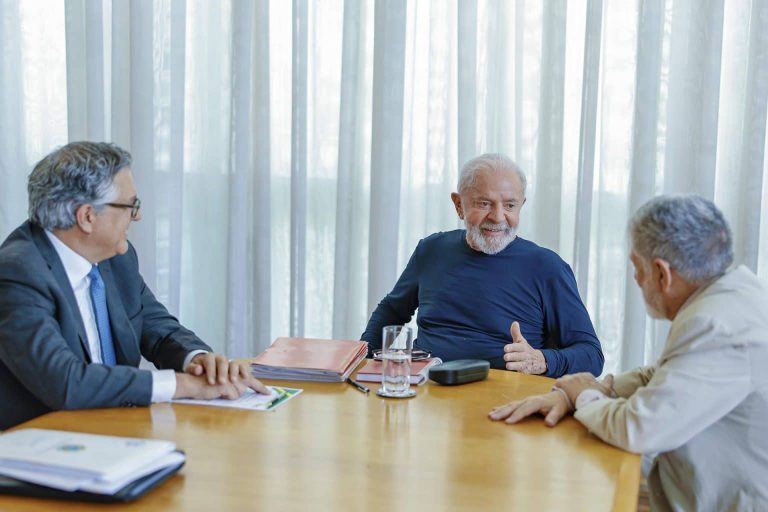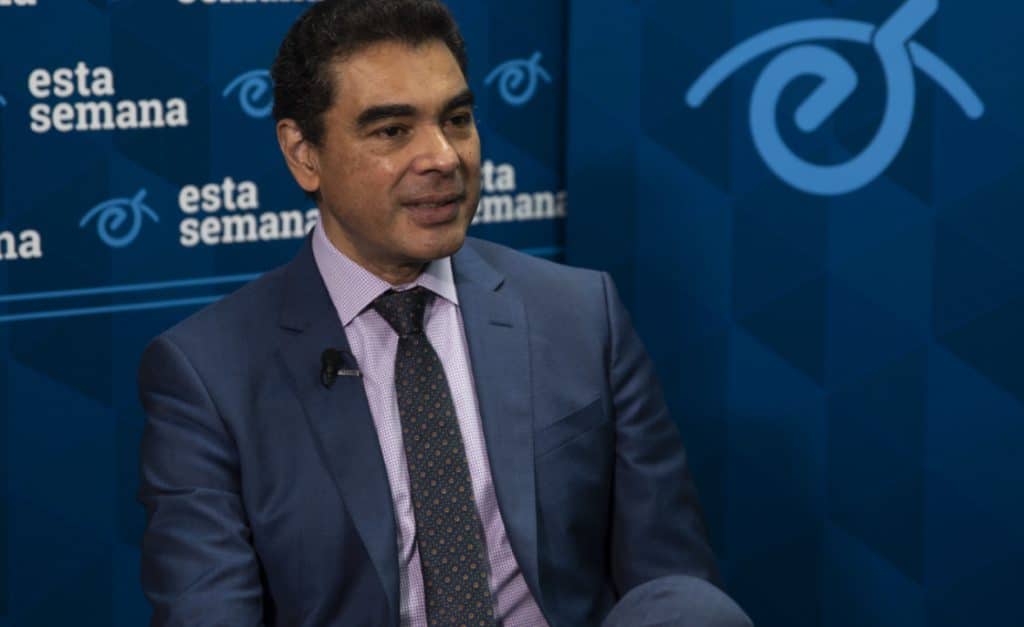29 de octubre 2024

Children of Exile: The Births “Sowing Hope” in the Camp of Nicaraguan Farmers

PUBLICIDAD 1M
PUBLICIDAD 4D
PUBLICIDAD 5D
“Except for Brazil, practically all the world's dictatorships are together in the so-called BRICS group,” says Manuel Orozco

Brazil's veto, issued by President Luiz Inácio 'Lula' da Silva, seen here with two of his closest collaborators, prevented the entry of Nicaragua and Venezuela into the BRICS group, further isolating both dictatorships. // Photo: EFE/ Ricardo Stuckert
What is the significance of Brazilian President Lula's veto, which prevented dictator Daniel Ortega from being accepted into the forum of emerging countries known as BRICS, led by Russia, China, India, Brazil and South Africa?
On October 22, at the BRICS summit held in Kazan, Russia, thirteen countries were accepted as new members of this forum, including Cuba, Bolivia, Algeria, Belarus, Indonesia, Malaysia, Nigeria, Thailand, Turkey, Kazakhstan, Uganda, Uzbekistan and Vietnam. However, the candidacies of Nicaragua and Venezuela were rejected due to the lack of consensus caused by the veto of President Lula of Brazil.
Political scientist Manuel Orozco, director of the Migration, Remittances and Development program of the Inter-American Dialogue, says that “the rejection of Nicaragua is a very big blow, because not even [other] dictatorships want to have anything to do with Nicaragua and Venezuela.”
In an interview with Esta Semana airing on October 27, 2024 on CONFIDENCIAL's YouTube channel –due to television censorship in Nicaragua– Orozco said that Nicaragua "failed to achieve membership in a group that calls itself the new Non-Aligned Movement of the 21st century, and which also identifies itself as 'the Dictatorships Club.' Except for Brazil, practically all the dictatorships of the world are together in the so-called BRICS group,” according to Orozco.

The Daniel Ortega dictatorship and the Nicolas Maduro regime were vetoed by President Lula of Brazil, preventing them from joining the Political and Economic Forum of emerging countries known as BRICS, led by China, Russia, India and South Africa. What is the impact on Nicaragua of this exclusion?
It has a major diplomatic impact because it excludes [Ortega] from an important conglomerate that has been forming. It started with four countries, grew to ten and now has more than 20 associate members that are trying to create a platform for regional cooperation through trade and finance. And it excluded Nicaragua. So it is a diplomatic blow to not be let in. At the same time, it has economic implications as well.
What are those economic implications? There is a BRICS bank which is a relatively small bank compared to the World Bank. Do they have other kinds of economic services?
There are two levels of impact. One is that Nicaragua failed to achieve membership in a group that calls itself the new Non-Aligned Movement of the 21st century. This group also identifies itself as "the Dictatorships Club." Except for Brazil, practically all the dictatorships of the world are together in a formalized group known as BRICS. The rejection of Nicaragua is really a very big blow, because not even other dictatorships want to have anything to do with Nicaragua and Venezuela.
Secondly, it's economically and numerically true that with the Chinese factor, the ten main countries account for 25% of world GDP. So that's a lot and a very strong commercial weight, because with China it actually increases to 30%.
However, in terms of trade relations, it is not yet effective. The payment platform they are creating –BRICS Pay– as an alternative to SWIFT [for bank transactions], is intended to use the currency of these countries, using the [Russian] ruble and the Chinese renminbi as a mechanism against the dollar in order to "de-dollarize" the global economy.
The influence of that is limited. Nicaragua had hoped that through this mechanism they would be able to use the córdobas they have, which have been sanctioned, to make transfers through the BRICS system. Now that possibility is more limited. And the big problem is that they will not have the possibility of carrying out some transactions that they had planned with Russia, particularly through the BRICS clearinghouse. So, yes, it's an economic blow [to Nicaragua], especially in terms of reducing the regime's ability to generate greater kleptocracy, greater transactions to the inner circle of power.
President Lula's advisor, Celso Amorim, said that Nicaragua's exclusion was a result of the “offensive” treatment received by President Lula when Daniel Ortega said he was being “dragged down by imperialism” after severing diplomatic relations. In the case of Maduro, Lula said it was because “Maduro didn't keep his word” to present the electoral records after the fraud of July 28. In other words, there is a direct rejection of Daniel Ortega.
It's actually more than that. Those are really good excuses. But the reality is that for Brazil, allowing these two countries to enter BRICS was complicated, because from the perspective of Brazil's foreign policy, they are trying to promote a democratization process throughout Latin America and the Caribbean. Cuba aside, what they want is to enter into a process of democratic transition to reduce the democratic decline that is taking place at the regional level and that is affecting Brazil. So it was easy for Brazil to veto Venezuela and Nicaragua on these grounds since it had no other way to say they shouldn't be admitted. So that was the mechanism Brazil used.
Venezuela reacted harshly, attacking Lula and describing the Brazilian veto as a “hostile and immoral aggression.” But in the case of Nicaragua, the regime remained silent and Vice President Murillo actually came out praising the BRICS group, hiding the fact that Ortega and his dictatorship had been vetoed and were rejected from being part of the BRICS. How is this silence to be interpreted?
The [regime] didn't want to make fools of themselves. If they responded politically by attacking Brazil for not having let them into the “Dictatorship Club,” all the eyes of the world would be on Nicaragua as to why that country was excluded, and that would have had a boomerang effect against them. So they preferred to keep quiet and praise Putin, which [they think] somehow gives them more diplomatic mileage, and move on.
What is the potential reach of Lula's position towards Nicaragua and Venezuela? Might it have a greater impact on the position of the democratic governments of Latin America towards these two dictatorships, or is it more a circumstantial fact, in which Brazil is simply paying Nicaragua and Venezuela back for their behavior?
No, it's more than just payback. It really is a repositioning of Brazil in its foreign policy in Latin America, in which it's trying to manage a more consistent perspective in relation to the political instability that exists in the region. Brazil is basically managing to get some diplomatic support that allows it to have leadership, especially within the OAS, to promote their own agenda. So this move is vital for that.
This article was published in Spanish in Confidencial and translated by our staff. To get the most relevant news from our English coverage delivered straight to your inbox, subscribe to The Dispatch.
PUBLICIDAD 3M
Periodista nicaragüense, exiliado en Costa Rica. Fundador y director de Confidencial y Esta Semana. Miembro del Consejo Rector de la Fundación Gabo. Ha sido Knight Fellow en la Universidad de Stanford (1997-1998) y profesor visitante en la Maestría de Periodismo de la Universidad de Berkeley, California (1998-1999). En mayo 2009, obtuvo el Premio a la Libertad de Expresión en Iberoamérica, de Casa América Cataluña (España). En octubre de 2010 recibió el Premio Maria Moors Cabot de la Escuela de Periodismo de la Universidad de Columbia en Nueva York. En 2021 obtuvo el Premio Ortega y Gasset por su trayectoria periodística.
PUBLICIDAD 3D